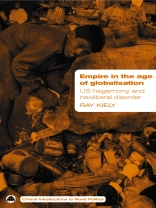This book examines the relationship between US hegemony and contemporary globalisation.
Many introductory textbooks on globalisation tend to be simplistic and conservative. This book moves things forward, providing a critical review of the globalisation debate. Kiely reveals the weaknesses of globalisation theory, and argues that we can only approach a proper understanding of the contemporary world order by linking globalisation to debates on capitalism, imperialism, neo-liberalism and universal human rights. He explores US hegemony in the light of these issues, showing how ‘liberal internationalism’ cannot be separated from capitalism, neo-liberalism and US empire-building.
Mục lục
Acknowledgements
1. Introduction
2. Globalisation theory or capitalist globalisation?
3. Globalisation and politics 1: state sovereignty, cosmopolitanism and imperialism
4. Globalisation and politics 2: international relations and the post-September 11th world
5. The global economy: US hegemony from Bretton Woods to neo-liberalism
6. Globalisation, culture and rights: liberal internationalism, imperialism and universalism
7. Conclusions: US imperialism, actually existing globalisation, and the question of alternatives
References
Index
Giới thiệu về tác giả
Ray Kiely is Professor of International Politics at Queen Mary, University of London. He has authored a number of books, including Empire in the Age of Globalisation (Pluto, 2005).












